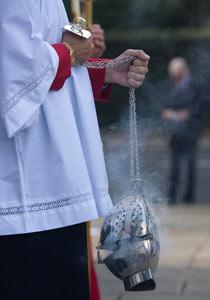Sexual Abuse Compensation Case to Test Legal Limits of Church's Liability
By Owen Bowcott
Sympathy with victims of sexual abuse should not be grounds for courts to extend the law on compensation "infinitely" and impose extra liabilities on employers, the court of appeal has been told. In a test case that could alter relationships between many organisations and their staff, the trustees of a Catholic diocese are denying responsibility for crimes allegedly committed by a priest in a children's home. The claim has been brought by a 47-year-old woman – known to the court as JGE – who says she was sexually and physically assaulted at the Firs children's home in Waterlooville, Hampshire, in the early 1970s. The claimant maintains that the nun in charge of the home assaulted her and that Father William Baldwin, the local parish priest, who has since died, sexually abused and raped her. The high court ruled that the trustees of the Portsmouth Roman Catholic Diocesan Trust were "vicariously liable" for the actions of Baldwin, even though the court was told that priests do not receive a salary. Lord Faulks QC, who represented the trustees, said they regarded sexual abuse as an "abhorrence". But, he warned, the courts took the view that responsibilities imposed on employers were not "infinitely extendable". "It is hard to avoid the conclusion that the adverse publicity that has surrounded the Catholic church in relation to sexual abuse in recent times has caused the [high court] judge to make a substantial leap in reasoning so as to associate the priesthood ipso facto with sexual abuse. That is not a satisfactory legal approach," Lord Faulks said. He said this decision had "wide-ranging consequences for employers and many other institutions well beyond the Roman Catholic church" and "the law is in danger of becoming incoherent and developing in an unprincipled way. "The understandable desire of the courts to give compensation to victims of sexual abuse beyond that provided for by parliament, or under existing laws should not have that effect." The diocesan trustees also dispute whether Baldwin could have abused the woman, maintaining that he became the local priest after the alleged victim had left the children's home." The trustees "deny that they are vicariously liable for Father Baldwin as a matter of law on the basis that a priest is the holder of an office and not an employee or otherwise in [their] service. "While the priest owes his bishop reverence and obedience, he exercises his ministry as a co-operator and collaborator rather than as someone who is subject to the control of his superior as would be the case in the employment field … [he is] the holder of an ecclesiastical office." But Elizabeth-Anne Gumbel QC, for JGE, told the appeal court that "the relationship was one of empowerment and granting of authority – [the trustees] provided the premises, the pulpit and the clerical robes to Father Baldwin and gave him the authority to carry out their work." To find they could not be liable for Baldwin's alleged crimes "would be to in effect exempt the Roman Catholic church from a position where they may be vicariously liable for any [wrongs] committed by priests," she argued.
|
.
Any original material on these pages is copyright © BishopAccountability.org 2004. Reproduce freely with attribution.
